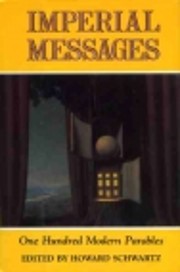

Klik op een omslag om naar Google Boeken te gaan.
|
Bezig met laden... Imperial Messagesdoor Howard Schwartz
 Geen Bezig met laden...
Meld je aan bij LibraryThing om erachter te komen of je dit boek goed zult vinden. Op dit moment geen Discussie gesprekken over dit boek. Geen besprekingen geen besprekingen | voeg een bespreking toe
"Whether incorporating the innocent charm of a fairy tale or the menacing confusion of a dream, the modern parable - like its predecessor the ancient scriptural parable - is a brief story infused with a moral dimension. Meaning does not lie exposed on the surface but, submerged, waits for the reader who has ears to hear the message, which may come instantly as an insight or reveal itself languorously, stirring up the unconscious contents of the psyche. This meaning or moral is the essence of the narrative form which has continued to challenge some of the most important thinkers and writers of the 20th century, including Franz Kafka, Jorge Luis Borges, Elie Wiesel, Isak Dineson, Bertolt Brecht, Isaac Bashevis Singer, Italo Calvino and Gabriel Garcia Marquez. With this splendid collection, editor and parablist Howard Schwartz announces "the resurrection of the parable as a literary genre," presenting 100 parables by 72 modern practitioners of the form, placing primary emphasis on writers of this century and including a sampling of 19th century parables by such writers as Dostoyevsky, Poe and Gogol." "With backdrops ranging from ancient civilizations to a motorcycle social club to space travel, these modern parables speak to both the emotions and the intellect. The title story, Kafka's "An Imperial Message," tells of a message from a dying emperor to his lowliest subject, a message which must travel a long distance and, even then, doesn't quite arrive. Kafka counsels both the subject and the modern reader, "you sit at your window when evening falls and dream it to yourself." Charming, imaginative and enigmatic, these modern parables have been dispatched to provide the reader with messages to read, to dream on, to ponder and to enjoy."--BOOK JACKET.Title Summary field provided by Blackwell North America, Inc. All Rights Reserved Geen bibliotheekbeschrijvingen gevonden. |
Actuele discussiesGeen
 Google Books — Bezig met laden... Google Books — Bezig met laden...GenresDewey Decimale Classificatie (DDC)808.831Literature By Topic Rhetoric and anthologies Anthologies & Collections Fiction Short storiesLC-classificatieWaarderingGemiddelde: Geen beoordelingen.Ben jij dit?Word een LibraryThing Auteur. |
||||||||||||||||||||||||||||||||||||||||||||||||||||||||||||||||||||||||||||||||||||||||||||||||||||